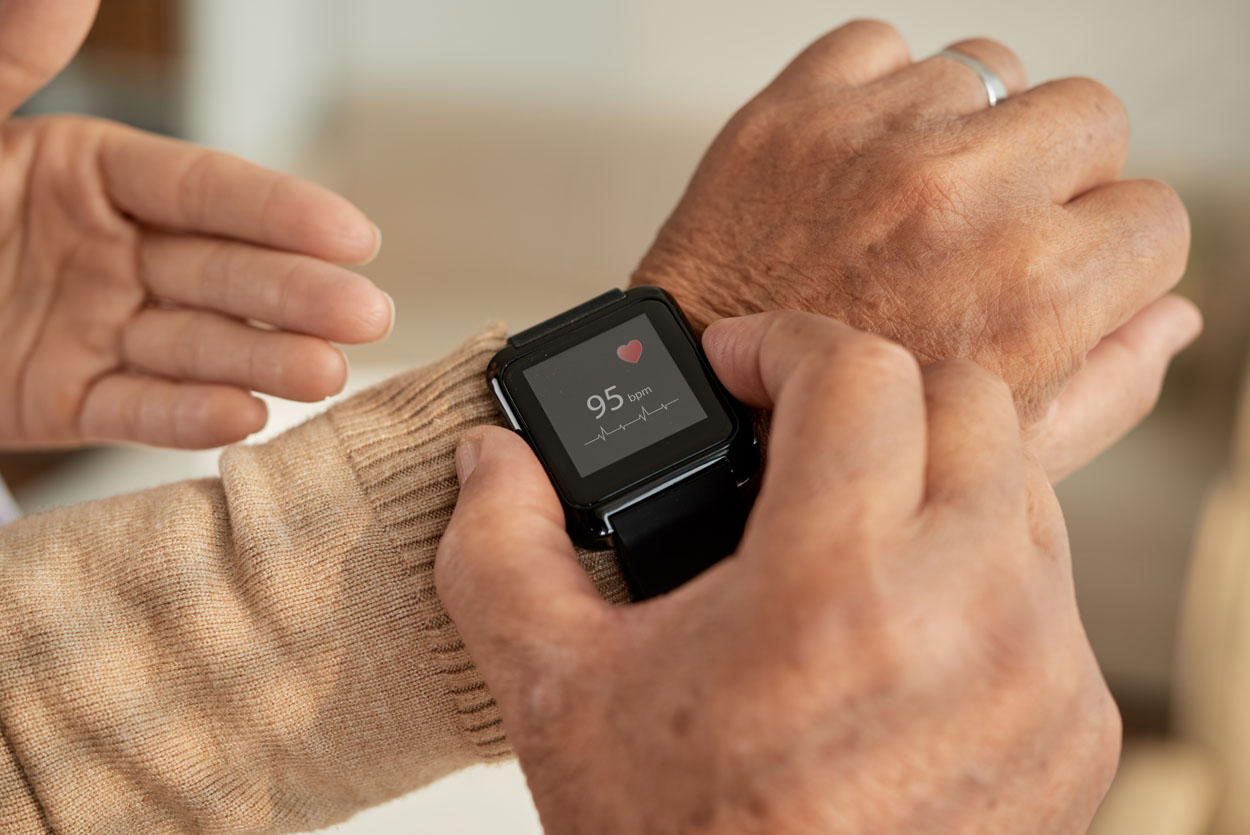The Covid-19 pandemic thrust global healthcare systems into a new reality. Where these systems had been primarily built around face-to-face interactions between healthcare practitioners and patients, there was now a seismic shift towards remote consultations and an increasing opportunity for patients to self-report their symptoms via digital means.
For Professor Mel Calvert, Centre Director for the Centre for Patient Reported Outcome Research (CPROR) at the University of Birmingham, it was a hastening of a trend that had been developing for some time.
“The value of patient reported outcomes (PROs) was already building pre-pandemic,” she says. “Regulators and policy makers in healthcare recognise the importance of PROs to provide information on the burden of disease and the risks and benefits of treatments from the patient perspective. The pandemic has accelerated a shift towards tele-medicine and remote monitoring of patients through apps or wearable technologies. These offer an opportunity to collect PRO data en masse and to make our systems more efficient and effective.”
PROs are, in simple terms, health status directly reported by the patient who experienced it – rather than an outcome reported by a healthcare professional. They are important for capturing a patient perspective on the impact of disease or treatment on their symptoms, physical function or quality of life, particularly those factors that might not be captured by traditional clinical measurements. PROs can not only inform a patient’s own clinical care, but also the design and implementation of future interventions for other patients.
CPROR was founded in 2016 to help optimise the use of PROs in clinical trials and routine care, to improve service delivery, enhance patient care and ensure that the patient perspective is kept at the heart of health research and decision-making.
The Centre is made up of around 80 members working with patient partners and many more international collaborators. The Centre draws on expertise from across the University campus and Birmingham Health Partners. It brings together healthcare professionals and international collaborators with academics from the Medical School, Law, Applied Research, Social Sciences, and beyond.
Read more examples of our interdisciplinary research...
“PROs will be central to our healthcare systems going forward,” says Professor Calvert. “But you can’t just develop PROs in silos and try to deploy them because they ‘should work’ in theory. What we’re able to do at the Centre is bring the right people together at the right time, and get the requisite breadth of expertise to co-develop PRO systems that address the needs of patients, clinicians and policymakers”.
“CPROR provides methodological expertise and considers the use of PROs in both clinical trials and routine care settings. They ask important questions such as: What matters to patients and their families and what information about symptoms and quality of life will help them make informed choices about treatment? What evidence will be required for regulators to assess risks and benefits of treatment in trials? How can PROs help support clinical care, in an environment where resources are stretched? When you’ve got these intricate, sometimes competing, forces at play it’s vital that you have the interdisciplinary team to navigate the challenges and develop effective solutions.”
The work at CPROR has been supported by the University’s Institute of Advanced Studies, who hosted a series of workshops and fellows. Their 2018 workshop ‘Putting Patients at the Heart of Healthcare’ brought together experts to explore mechanisms for embedding efficient routine ePROM data capture within the NHS to facilitate efficient service delivery, improved patient care and enhanced patient outcomes.
A change in focus
The increased emphasis on, and adoption of, PROs has somewhat changed the remit for CPROR. No longer are they having to ‘bang the drum’ for the value of PROs and urge organisations to collect this valuable data - rather they are keen to ensure that PROs are being used in an appropriate and helpful way.
“There a now thousands of PRO measures and a multitude of apps available to collect PROs,” explains Professor Calvert. “It creates a different problem entirely. You need to have a clear purpose for collecting the data and collect what matters. If you collect PROs in an unthinking way it can have the opposite effect to what you intended and be detrimental to patients and practitioners.”
With healthcare systems and research initiatives spanning multiple countries, often operating on different platforms and using different measures (even within countries), PROs being collected with inconsistent variables only confounds an already complicated data landscape. Professor Calvert points to a thoughtful design process of PROs as being key in addressing those problems – in which developers start by getting to grips with the fundamentals of why data is being collected (and if, in fact it is needed and valuable for practitioners, researchers and patients), and then mapping out how the data is collected.

“There are a lot of things to consider in the design phase. What you sometimes see is a project that hasn’t fully appreciated the resources required to maintain the collection and analysis of patient data. It’s also common to find PRO systems that haven’t considered the importance of inclusivity, equality and accessibility – not everyone is able to complete online forms or apps, for example.”
To that point, a paper in Nature Medicine (Calvert et. al 2022) on the matter of equitable and inclusive PRO collection, points to an estimate that ‘37% of the world’s 7.8 billion population are digitally excluded, with older people, people on low incomes and other marginalised groups most likely to be affected’.
This paper is part of a concerted effort by CPROR and its partners, including the NIHR Birmingham Biomedical Research Centre to press for inclusive PRO data collection. It underpins their ongoing work in developing guidelines for inclusive practice that addresses the diverse needs of all patients, including groups historically and currently underserved by research.
“As we capture more PRO data, and it is increasingly done by electronic means, we risk contributing to a two-tiered healthcare system where our policies and treatments are weighted towards those whose data was collected in the first place,” explains Professor Calvert.
She calls for this equitable design to be included as part of a more sophisticated approach to collecting patient data, and one that also acknowledges that many individuals live with multiple long-term health conditions.
“A patient with heart disease, for example, might have a PRO form to fill in via an app every week. But they might also have a concurrent skin condition, or another ailment, that requires an online form to be submitted once a month. That’s not user friendly, and it might mean those two PROs – while inextricably linked in the patient’s world – remain entirely distant from one another in terms of how they’re analysed.”

That concern speaks to a core pillar of the CPROR work – keeping the patient at the centre of PRO design. That means having a considerate, holistic approach that understands the complexity of healthcare, something that is only possible with interdisciplinary expertise.
With more and more patient data being collected, there is added focus on the ethical and legal requirements of PROs.
Artificial Intelligence (AI) appears to be the next frontier for PROs. It presents endless opportunities to improve healthcare, but comes laden with risk should it not be designed correctly.
PRO data may contribute to AI models as an input, or be used to measure the effectiveness of an AI-driven intervention, but the efficacy and fairness of AI algorithms and any decisions drawn from them will be dependent on the data it is trained upon coming from equitable datasets as outlined in recent work led by CPROR team member Dr Samantha Cruz Rivera.
“This is where you rely on expertise from different areas; ethics, law, computer science, modelling, health informatics, social policy,” says Professor Calvert. “Particularly when it’s a new horizon as there is less to draw on from the existing literature.”
The STANDING Together Project is working to develop standards that ensure datasets for training and testing AI systems are diverse, inclusive, and promote AI generalisability. Patients, public, health professionals, researchers, ethicists and policy makers will work together to agree what the essential criteria for datasets should be, and develop new recommendations for AI datasets.
“I’m always drawn to ‘what’s next’ and thinking about where we need to be innovative and who we’ll need to collaborate with for guidance and support. It’s important to be scanning the horizon at all times because we have to be ahead of the curve. It’s a lot more challenging to retrospectively improve PROs once they’re already embedded in a system.”
The value of being agile
Of course, staying ahead of the curve is not always possible. The Covid-19 pandemic was not only a shock to global healthcare systems, but to researchers working on improving healthcare. For the CPROR team, it meant having to swiftly understand how to implement a PRO specifically for patients reporting symptoms of ‘long COVID’.
Over 100 million people are thought to be affected by Long COVID, but attempts to study the condition were stifled by the complexity of symptoms that effect many organs in the body. Patients had told researchers that existing questionnaires did not fully capture the breadth of their symptoms.
The standard development of a PRO tool tends to take between three and five years. The Birmingham team, led by Professor Calvert and Dr Sarah Hughes (Research Fellow at Birmingham’s Institute of Applied Health Research) developed and validated the Symptom Burden Questionnaire™ for Long COVID (SBQ™-LC ) within a year.
SBQ™-LC can capture symptoms from 16 domains (categories of symptoms), and one scale that measures symptom impact on daily life, without being burdensome for patients who can complete it either on paper, or via a digital App. It has already been licensed for use in over 50 countries throughout the world.
“We’re in a fortunate position in Birmingham because we have built up a cross-disciplinary network with the breadth and depth of expertise required for such a challenge. That allows us to be agile and we were well placed to move quickly and develop a PRO that can be used to evaluate the impact of treatments for long COVID and inform clinical management,” concludes Professor Calvert.